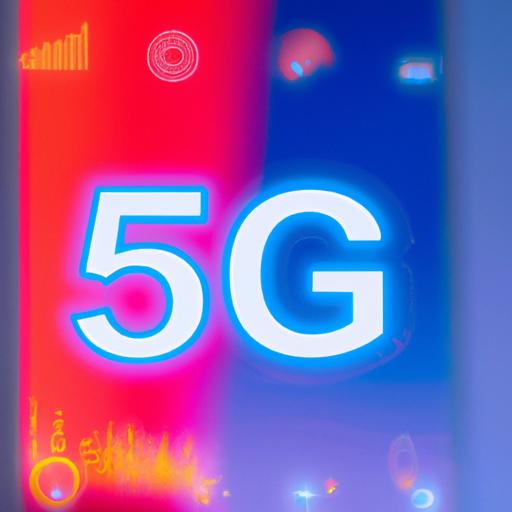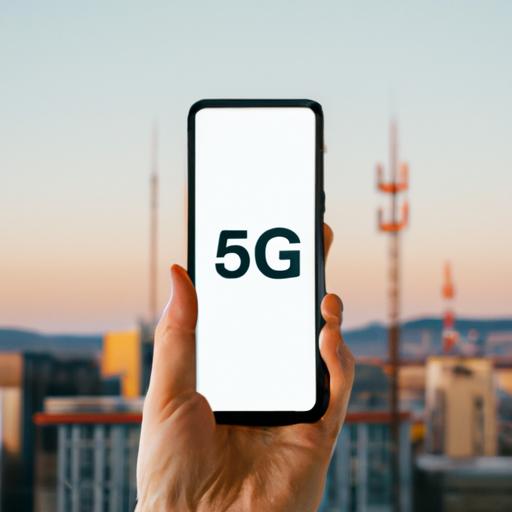If you’re in the market for a new phone, you may have heard a lot of buzz about 5G technology. But what is a 5G phone, and why is it important? In this ultimate guide, we’ll answer all your questions about 5G phones.
1. What is 5G Technology?

5G technology is the latest generation of mobile network technology, designed to offer faster speeds and more reliable connectivity. It uses a different frequency spectrum than previous generations of mobile networks, which allows for more data to be transmitted at once.
How is it different from previous generations of mobile networks?
One of the main differences between 5G technology and previous generations of mobile networks is speed. 5G technology is expected to be up to 100 times faster than 4G, offering download speeds of up to 10 gigabits per second. This means that you’ll be able to download large files, stream video, and browse the internet at lightning-fast speeds.
Another difference is latency, or the time it takes for data to travel from one device to another. 5G technology has the potential to reduce latency to less than 1 millisecond, which means that devices will be able to communicate with each other almost instantaneously. This is important for applications like virtual and augmented reality, where even a small delay can cause motion sickness and other problems.
Benefits of 5G Technology
There are many benefits to 5G technology, including:
- Faster internet speeds
- Lower latency
- Enhanced virtual and augmented reality experiences
- Improved battery life
- More reliable connectivity
Overall, 5G technology is expected to revolutionize the way we use our mobile devices, offering faster speeds, more reliable connectivity, and new opportunities for innovation.
2. How Does a 5G Phone Work?
Overview of the Technology Behind 5G Phones
5G phones work by connecting to a 5G network, which uses a combination of different technologies to provide faster speeds and more reliable connectivity. These technologies include:
- Millimeter Wave (mmWave): A high-frequency spectrum that allows for faster speeds but has a shorter range.
- Sub-6 GHz: A lower frequency spectrum that has a longer range but slower speeds.
- Small Cells: These are small antennas that are placed in urban areas to provide more coverage and capacity.
When a 5G phone connects to a network, it uses a combination of these technologies to provide the fastest and most reliable connection possible.
Components of a 5G Phone
To connect to a 5G network, a phone needs several components, including:
- Antennas: These are the components that send and receive signals from the network. 5G phones typically have multiple antennas to provide the best possible connectivity.
- Modems: These are the components that decode the signals from the network and convert them into data that can be used by the phone.
- Processors: These are the components that handle the data that is transmitted and received by the phone. 5G phones typically have more powerful processors than previous generations of phones to handle the increased data speeds.
How 5G Phones Connect to the Network
5G phones connect to the network using a process called “handover,” which involves switching between different cells as the user moves around. When a phone is connected to a 5G network, it constantly communicates with nearby cells to determine which one is providing the best signal. If the signal from one cell becomes too weak, the phone will automatically switch to a stronger signal from another cell.
Overall, the technology behind 5G phones is complex, but it allows for faster speeds and more reliable connectivity than previous generations of mobile networks.
Features of a 5G Phone
5G phones come with a range of features that set them apart from previous generations of mobile devices. Here are some of the most noteworthy features:
Faster Internet Speeds
One of the most significant benefits of a 5G phone is faster internet speeds. With download speeds of up to 10 gigabits per second, you’ll be able to download large files, stream video, and browse the internet at lightning-fast speeds. This means that you’ll be able to watch high-quality video content without buffering, download large files quickly, and browse the internet without delays.
Low Latency
Another key feature of 5G technology is low latency. This means that there’s less delay between when you perform an action on your device and when it’s executed. For example, when you’re playing a game on a 5G phone, you’ll experience almost no lag, which makes for a smoother and more enjoyable gaming experience.
Enhanced Virtual and Augmented Reality Experiences
5G technology has the potential to revolutionize virtual and augmented reality experiences. With faster internet speeds and lower latency, you’ll be able to enjoy high-quality VR and AR experiences without any lag or delay. This is especially important for applications like gaming, where even a small delay can ruin the experience.
Improved Battery Life
Many 5G phones come with improved battery life, thanks to more efficient hardware and software. This means that you’ll be able to use your phone for longer periods of time without needing to recharge it. This is especially important if you use your phone heavily for work or entertainment.
Other Features
In addition to the features mentioned above, 5G phones come with a range of other features, depending on the model and brand. Some common features include:
- High-quality cameras
- Advanced security features
- Water and dust resistance
- Large, high-resolution displays
Overall, 5G phones offer a range of features that make them an attractive option for anyone in the market for a new mobile device. With faster internet speeds, lower latency, and improved battery life, they’re designed to offer the best possible user experience.
4. Advantages of Owning a 5G Phone
As 5G technology spreads around the world, more and more people are investing in 5G phones. But what are the advantages of owning a 5G phone? Let’s take a closer look.
Better streaming and downloading
One of the most significant advantages of 5G technology is faster internet speeds. This means that you’ll be able to stream movies and TV shows without any buffering or lag, even in high definition. You’ll also be able to download large files, like games and apps, in a matter of seconds.
Improved video and call quality
5G technology has the potential to improve video and call quality, making it easier to stay connected with friends, family, and colleagues. With 5G, you’ll be able to make video calls in high definition, with minimal lag, even when you’re on the go.
Enhanced gaming experiences
If you’re a gamer, you’ll love the benefits of 5G technology. 5G offers lower latency, which means that you’ll be able to play games online without any delay. This is especially important for fast-paced games, where even a small delay can make a big difference.
Increased productivity
5G technology can also help increase productivity, whether you’re working from home or on the go. With faster internet speeds, you’ll be able to access and share files quickly, collaborate with colleagues in real-time, and get more done in less time.
Other advantages
There are many other advantages to owning a 5G phone, including:
- Improved battery life
- More reliable connectivity
- Enhanced virtual and augmented reality experiences
- Faster and more accurate GPS
- And more
Overall, owning a 5G phone has many advantages, from faster internet speeds to improved video and call quality, enhanced gaming experiences, and increased productivity.
5. 5G Phone Brands and Models
If you’re in the market for a 5G phone, you may be wondering which brands and models are the best. Here’s a breakdown of some of the most popular 5G phone brands and models available today.
Overview of Popular 5G Phone Brands
-
Samsung: Samsung has several 5G phone models available, including the Galaxy S21 5G, Galaxy Note20 5G, and Galaxy Z Fold2 5G. These phones are known for their high-quality cameras, large screens, and innovative designs.
-
Apple: Apple’s 5G phone offering is the iPhone 12, which comes in several different models including the iPhone 12, iPhone 12 mini, iPhone 12 Pro, and iPhone 12 Pro MaThese phones are known for their sleek design, powerful processors, and excellent camera quality.
-
Google: The Google Pixel 5 is Google’s first 5G phone, and it’s quickly gaining popularity. This phone is known for its excellent camera quality, long battery life, and sleek design.
-
OnePlus: OnePlus has several 5G phone models available, including the OnePlus 9 5G and the OnePlus 9 Pro 5G. These phones are known for their fast charging capabilities, high-quality displays, and powerful processors.
Comparison of Different 5G Phone Models
When it comes to comparing different 5G phone models, there are several factors to consider. Some of the most important factors include:
-
Price: 5G phones can be expensive, so it’s important to consider your budget when choosing a phone.
-
Camera Quality: If you’re someone who loves taking photos and videos, you’ll want to choose a phone with a high-quality camera.
-
Battery Life: 5G technology can be a drain on your phone’s battery, so it’s important to choose a phone with a long battery life.
-
Screen Size: If you like to watch videos or play games on your phone, you’ll want to choose a phone with a large screen.
Pros and Cons of Each Brand and Model
Each 5G phone brand and model has its own pros and cons. Here are some of the most common pros and cons of each brand and model:
-
Samsung: Pros include high-quality cameras, large screens, and innovative designs. Cons include high price points and some users may find the software to be too cluttered.
-
Apple: Pros include sleek design, powerful processors, and excellent camera quality. Cons include high price points and some users may find the lack of customization options limiting.
-
Google: Pros include excellent camera quality, long battery life, and sleek design. Cons include a limited selection of models and some users may find the software to be too bare-bones.
-
OnePlus: Pros include fast charging capabilities, high-quality displays, and powerful processors. Cons include mediocre camera quality and some users may find the software to be too comple
Ultimately, the best 5G phone for you will depend on your individual needs and preferences. Consider your budget, the features you need, and the design you prefer when choosing a 5G phone.
Conclusion
In conclusion, a 5G phone offers many benefits over previous generations of mobile networks. With faster internet speeds, lower latency, and more reliable connectivity, you’ll be able to do more with your phone than ever before. Whether you’re streaming video, playing games, or working on the go, a 5G phone can help you do it all faster and more efficiently.
As more and more devices become connected to the internet, 5G technology will become increasingly important. It has the potential to revolutionize industries like healthcare, transportation, and entertainment, offering new opportunities for innovation and growth.
If you’re in the market for a new phone, consider choosing a 5G phone to take advantage of these benefits. With a range of brands and models to choose from, you’re sure to find a 5G phone that meets your needs and fits your budget.
Thank you for reading our ultimate guide to 5G phones. We hope that it has answered all your questions about what a 5G phone is and why it’s important.
